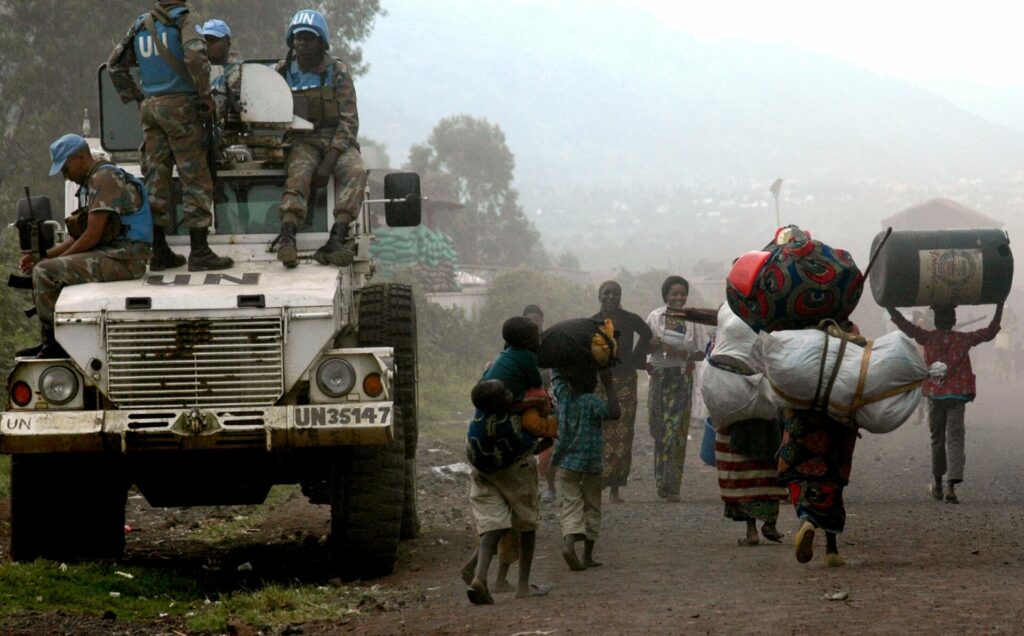The humanitarian situation has deteriorated over recent months in the Democratic Republic of Congo (DRC), according to a United Nations expert panel report.
This report focuses particularly on instability in the provinces of North Kivu (east), Ituri (northeast) and Maï-Ndombe (west). It argues that the Rwandan army is once again supporting the M23 rebellion, known as the March 23 Movement.
The so-called “halfway report” was delivered to the Security Council’s committee for DRC, as established by resolution 1533 (2004). After a thorough investigation spanning 163 pages, it focuses on the networks woven by both local and foreign armed groups active in the region formerly known as Zaire.
It highlights significant bouts of violence in the eastern provinces of DRC, along with violent episodes in Maï-Ndombe. The study period concluded in late November 2021, preceding the official start of the electoral campaign for the presidential elections on the 20-21 December. Current President Felix Tshisekedi was re-elected with 73% of the vote.
Greatest displacement crisis
With approximately seven million internally displaced persons, the highest ever recorded in DRC, the report places it in the context of one of the world’s greatest displacement crises.
In Maï-Ndombe province, the Teké and Yaka ethnic communities are highlighted for their roles in the deadly conflict that has spread to neighbouring provinces, leading to "hundreds of civilian deaths" and the widespread destruction of villages, schools, and medical centres.
The report notes the continued armament and mobilisation of Teké and Yaka communities. According to the experts, Mobondo fighters who have been captured or surrendered are integrated into the Armed Forces of the Democratic Republic of Congo (FARDC), before being sent to North Kivu to fight M23. This group, a former Tutsi-dominated rebellion defeated by FARDC forces in 2013 with support from UN Blue Helmets, took up arms again in late 2021.
In Ituri province, attempts at intercommunity dialogues to curb endemic violence have been unsuccessful. The report highlights a number of attacks against civilians, particularly in displaced people camps, by the armed group Cooperative for the Development of Congo/Union of Revolutionaries for the Defence of the Congolese People (CODECO-URDPC). It adds that the Zaire armed group continues to arm and train its fighters, opposing all peace initiatives.
In North Kivu and Ituri, the Allied Democratic Forces (ADF), a group subject to UN sanctions, continue to suffer from the intensification of Operation Shuja, led by both Congolese and Ugandan forces.
However, these rebels – originally Ugandan and predominantly Muslim, adapt their strategies, namely by multiplying attacks in Uganda.
New war coalition
According to the experts, as part of the "liberation" of territories under the sway of "foreign" armed groups such as the M23, Congolese armed groups have joined forces under the banner of the Wazalendo or "true patriots" to gain legitimacy and better position themselves in the event of possible integration into the FARDC.
In North Kivu, all the parties to the conflict have violated the ceasefire agreement, the report states.
The new coalition of armed groups supported by the Kinshasa government, the Volontaires pour la Défense de la Patrie (VDP), has triggered an outbreak of violence.
Violent fighting has resumed between the M23, supported by the Rwandan army (Rwanda Defence Force, RDF), and the FARDC, supported by the VDP, the Forces Démocratiques de Libération du Rwanda (FDLR, Hutu rebels), private military companies and the Burundi National Defence Force (FDNB), the experts list.
"Civilians from all communities found themselves in the crosshairs of the various parties to the conflict, exposed to reprisals and forced to flee. Both sides committed indiscriminate bombings, kidnappings and targeted assassinations," the report stresses.
Finally, the experts confirm that it was indeed the special forces of the Republican Guard (GR, an elite unit of the FARDC) who killed more than 57 unarmed demonstrators in Goma, the capital of North Kivu, on 30 August, "following rumours that they had been infiltrated by the M23".

